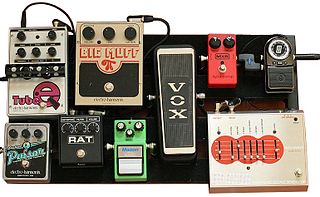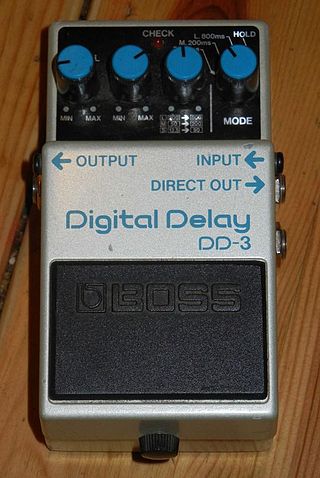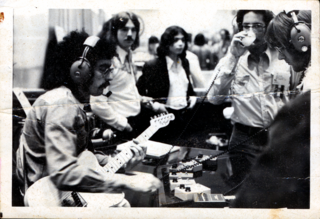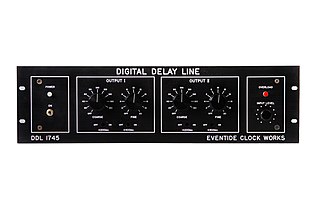Audio signal processing is a subfield of signal processing that is concerned with the electronic manipulation of audio signals. Audio signals are electronic representations of sound waves—longitudinal waves which travel through air, consisting of compressions and rarefactions. The energy contained in audio signals or sound power level is typically measured in decibels. As audio signals may be represented in either digital or analog format, processing may occur in either domain. Analog processors operate directly on the electrical signal, while digital processors operate mathematically on its digital representation.

An effects unit, effects processor, or effects pedal is an electronic device that alters the sound of a musical instrument or other audio source through audio signal processing.
Flanging is an audio effect produced by mixing two identical signals together, one signal delayed by a small and (usually) gradually changing period, usually smaller than 20 milliseconds. This produces a swept comb filter effect: peaks and notches are produced in the resulting frequency spectrum, related to each other in a linear harmonic series. Varying the time delay causes these to sweep up and down the frequency spectrum. A flanger is an effects unit that creates this effect.

Boss is a manufacturer of effects pedals for electric guitar and bass guitar. It is a division of the Roland Corporation, a Japanese manufacturer that specializes in musical equipment and accessories. For many years Boss has manufactured a wide range of products related to effects processing for guitars, including "compact" and "twin" effects pedals, multi-effect pedals, electronic tuners and pedal boards. In more recent times, Boss expanded their product range by including digital studios, rhythm machines, samplers and other electronic music equipment. They also are now manufacturing solid-state amplifiers and speaker heads such as the Waza and the Katana. Both feature multi-effects units meant to emulate Boss' classic effects pedals.

Scholz Research & Development, Inc. was the name of the company founded by musician and engineer Tom Scholz to design and manufacture music technology products.
Morley Pedals is the name of a guitar effects pedal company, famous for manufacturing wah-wah pedals and other treadle type effects for guitar. Morley pedals use electro-optical circuitry rather than a potentiometer to control the effect. The foot treadle controls a shutter inside the pedal that in turn controls the amount of light reaching a photoresistor. The advantage to this system is that there are no potentiometers in the signal path to wear out and become "scratchy sounding" over time. Electro-optical circuitry is used throughout the classic Morley pedal line, which includes or has included volume pedals, delay pedals, chorus and phaser pedals, and many others.
A phaser is an electronic sound processor used to filter a signal by creating a series of peaks and troughs in the frequency spectrum. The position of the peaks and troughs of the waveform being affected is typically modulated by an internal low-frequency oscillator so that they vary over time, creating a sweeping effect.

Electro-Harmonix is a New York City-based company that makes electronic audio processors and sells rebranded vacuum tubes. The company was founded by Mike Matthews in 1968. It is best known for a series of guitar effects pedals introduced in the 1970s and 1990s. EHX also made a line of guitars in the 1970s.

Moogerfooger is the trademark for a series of analog effects pedals manufactured by Moog Music. There are currently eight different pedals produced; however, one of these models is designed for processing control voltages rather than audio signal. A sixth model, the Analog Delay, was released in a limited edition of 1000 units and has become a collector's item. Moog Music announced on August 28, 2018, that the Moogerfooger, CP-251, Minifooger, Voyager synthesizers, and some other product lines were being built using the remaining parts on hand and discontinued thereafter.

The Ibanez Tube Screamer is an overdrive pedal made by Ibanez. First developed by Maxon as a competitor to the Boss OD-1, it was sold outside of Japan under the Ibanez brand and became popular among guitarists for its characteristic mid-boosted tone and amp-like distortion. The Tube Screamer has gone through multiple iterations since its debut in 1979, notably the original TS808 model and its successor, the TS9. Many guitarists have used it to create their signature sound, and it is considered one of the most successful, widely copied, and modified overdrive pedals in the history of the electric guitar.

Delay is an audio signal processing technique that records an input signal to a storage medium and then plays it back after a period of time. When the delayed playback is mixed with the live audio, it creates an echo-like effect, whereby the original audio is heard followed by the delayed audio. The delayed signal may be played back multiple times, or fed back into the recording, to create the sound of a repeating, decaying echo.

MXR is a New York–based manufacturer of effects pedals from Rochester. The company was co-founded in 1972 by Keith Barr and Terry Sherwood and incorporated as MXR Innovations, Inc. in 1974. The MXR trademark is now owned by Jim Dunlop.

Distortion and overdrive are forms of audio signal processing used to alter the sound of amplified electric musical instruments, usually by increasing their gain, producing a "fuzzy", "growling", or "gritty" tone. Distortion is most commonly used with the electric guitar, but may also be used with other electric instruments such as electric bass, electric piano, synthesizer and Hammond organ. Guitarists playing electric blues originally obtained an overdriven sound by turning up their vacuum tube-powered guitar amplifiers to high volumes, which caused the signal to distort. While overdriven tube amps are still used to obtain overdrive, especially in genres like blues and rockabilly, a number of other ways to produce distortion have been developed since the 1960s, such as distortion effect pedals. The growling tone of a distorted electric guitar is a key part of many genres, including blues and many rock music genres, notably hard rock, punk rock, hardcore punk, acid rock, grunge and heavy metal music, while the use of distorted bass has been essential in a genre of hip hop music and alternative hip hop known as "SoundCloud rap".
Re-amping is a process often used in multitrack recording in which a recorded signal is routed back out of the editing environment and run through external processing using effects units and then into a guitar amplifier and a guitar speaker cabinet or a reverb chamber. Originally, the technique was used mostly for electric guitars: it facilitates a separation of guitar playing from guitar amplifier processing—a previously recorded audio program is played back and re-recorded at a later time for the purpose of adding effects, ambiance such as reverb or echo, and the tone shaping imbued by certain amps and cabinets. The technique has since evolved over the 2000s to include many other applications. Re-amping can also be applied to other instruments and program, such as recorded drums, synthesizers, and virtual instruments.

TC Electronic is a Danish audio equipment company that designs and imports guitar effects, bass amplification, computer audio interfaces, audio plug-in software, live sound equalisers, studio and post-production equipment, studio effect processors, and broadcast loudness processors and meters. In August 2015, the company was purchased by Music Group, a holding company chaired by Uli Behringer.
In computer music and professional audio creation, a DirectX plugin is a software processing component that can be loaded as a plugin into host applications to allow real-time processing, audio effects, mixing audio or act as virtual synthesizers. DirectX plugins allow the replacement of traditional recording studio hardware and rack units used in professional studios with software-based counterparts that can be connected together in a modular way. This allows host manufacturers to focus on the conviviality and efficiency of their products while specialized manufacturers can focus on the digital signal processing aspect. For example, there are plugins for effects boxes, such as reverbs and delays, effects pedals, like guitar distortion, flange and chorus, and for mixing and mastering processors such as compressors, limiters, exciters, sub bass enhancers, stereo imagers and many more.

Multivox was an American-based synthesizer company since the mid-1970s until the 1980s. Originally it was founded in the mid-1940s as the guitar and amplifier manufacturing subsidiary of Peter Sorkin Music Company, a New York-based retailer/wholesaler. Then eventually it established separate corporate identity, and after the close of Sorkin Music in the mid-1970s, it continued in existence for fourteen years, according to the Blue Book of Guitar Values. In addition to synthesizers, the company marketed several effects pedals. These included the Big Jam series guitar effects line.

Record is a music software program developed by Swedish software developers Propellerhead Software. Designed for recording, arrangement and mixing, it emulates a recording studio, with a mixing desk, a rack of virtual instruments and effects and an audio and MIDI sequencer. Record can be used either as a complete virtual recording studio in itself, or together with Propellerhead Software's Reason.
Strymon is an American manufacturer of audio equipment, originally called Damage Control Engineering. They are best known for their line of high end guitar effects pedals which use a mixture of analog circuitry and digital signal processing. The company is based in Westlake Village, California, and manufactures products in the United States.

Eventide Inc. is an American pro audio, broadcast and communications company whose audio division manufactures digital effects processors, digital signal processor (DSP) software, and guitar effects pedals. Eventide was one of the first companies to manufacture digital audio processors, and its products are mainstays in sound recording and reproduction, post production, and broadcast studios.












